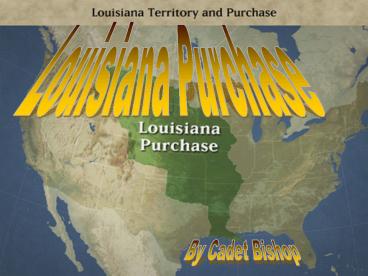Louisiana Purchase - PowerPoint PPT Presentation
1 / 9
Title:
Louisiana Purchase
Description:
Fearing that France might try to interfere with Western American trade in the ... James Monroe and American Minister to France Robert Livingston to discuss with ... – PowerPoint PPT presentation
Number of Views:724
Avg rating:3.0/5.0
Title: Louisiana Purchase
1
Louisiana Purchase
By Cadet Bishop
2
Soon after Thomas Jefferson became President, the
United States learned that Spain planned to
return Louisiana to France. Fearing that France
might try to interfere with Western American
trade in the port of New Orleans, Jefferson
instructed special envoy James Monroe and
American Minister to France Robert Livingston to
discuss with the French the possible purchase of
the port of New Orleans.
Soon after Thomas Jefferson became President, the
United States learned that Spain planned to
return Louisiana to France. Fearing that France
might try to interfere with Western American
trade in the port of New Orleans, Jefferson
instructed special envoy James Monroe and
American Minister to France Robert Livingston to
discuss with the French the possible purchase of
the port of New Orleans
3
- The French territory of Louisiana included far
more land than just the current U.S. state of
Louisiana. The lands purchased contained parts or
all of present-day Arkansas, Missouri, Iowa,
Minnesota west of the Mississippi River, North
Dakota, South Dakota, Nebraska, New Mexico,
northern Texas, Oklahoma, Kansas, the portions of
Montana, Wyoming, and Colorado east of the Rocky
Mountains, the portions of southern Manitoba,
southern Saskatchewan and southern Alberta that
drain into the Missouri River, and Louisiana on
both sides of the Mississippi River including the
city of New Orleans.
4
President Thomas Jefferson purchased the vast
territory of Louisiana from France for 15
million. The unmapped wilderness of approximately
900,000 square miles doubled the size of the
fledgling nation and helped shape the destiny of
the United States.
5
- The Louisiana Purchase was the acquisition by the
United States of more than 530 000 000 acres of
territory from France in 1803, at the cost of
about 3 per acre, or about 770 an acre in
todays money.
6
The Louisiana Purchase Exposition, informally
known as The Saint Louis World's Fair, was a
World's Fair held in the U.S. city of St. Louis,
Missouri, in 1904. The Fair celebrated the
centennial of the Louisiana Purchase (delayed one
year). It opened April 30, 1904, and closed
December 1 the same year.
7
The Federalists strongly opposed the purchase,
favoring close relations with Britain over closer
ties to Napoleon. The Federalists argued that the
purchase was unconstitutional and that the U.S.
had paid a large sum of money just to declare war
on Spain. The Federalists also feared that the
political power of the Atlantic seaboard states
would be threatened by the new citizens of the
west, bringing about a clash of western farmers
with the merchants and bankers of New England.
8
The Louisiana Purchase led to a dispute between
the United States and Spain over the boundaries
of the area the United States had bought.
According to the Spanish, Louisiana consisted
roughly of the west bank of the Mississippi River
and the city of New Orleans. The United States,
on the other hand, claimed that it stretched all
the way to the Rio Grande and the Rocky
Mountains, a claim unacceptable for Spain since
it would mean the loss of Texas and half of New
Mexico, both Spanish colonies
9
The End































